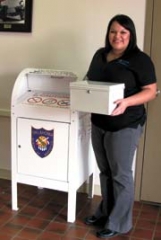Be Responsible with Your Prescription Drugs
Rogers County Drug Task Force provides free lock boxes for residents who use prescription opiates.
By: Carol Beck-Round | Category: In Our Communities | Issue: March 2014

Holding one of the free prescription lock boxes, Amber Brassfield with the Claremore Police Department is also on the Rogers County Drug Force, which encourages citizens to be responsible with their prescription drugs.
Prescription drug abuse is the nation’s fastest-growing drug problem. The problem is so critical that the Centers for Disease Control and Prevention has classified it as an epidemic. Rogers County is not immune. In Rogers County alone, there were 68 confirmed opiate overdose deaths between 1997 and 2007.
Joining forces, the Healthy Community Partnership and the Rogers County Prescription Drug Abuse Task Force are working together to address the problem. Through an Oklahoma Department of Mental Health grant, a prevention program was formed in March of 2012 to create and implement a strategic plan to address prescription drug abuse in Rogers County. The task force is a subgroup of Healthy Community Partnership, a coalition in Claremore formed to address prescription drug abuse among youth, and focuses on abuse among adults in Rogers County.
The grant has allowed for the hiring of Teresa Carnes as the strategic prevention framework and state incentive grant coordinator for Rogers County. “I am a certified prevention specialist,” says Carnes, who has undergone extensive training.
Since the grant was implemented, the task force has added two drop-off locations for unused medications. Locations include the Rogers County Sheriff’s Department, Claremore Police Department, Chelsea Police Department, Inola Police Department and Catoosa Police Department. “Our goal is to add one more drop-off location in the county,” she adds. “We work closely with the Oklahoma Bureau of Narcotics to create more awareness of this growing problem and to create the drop-off locations, which must be in a police station.”
In an effort to combat the abuse of opiate drugs – which are only one class of abused prescription drugs – the task force has created a new strategy to encourage individuals who have been prescribed these kinds of drugs, including hydrocodone, oxycodone and fentanyal, to keep their drugs under lock and key.
In August of 2013, the task force began providing free medical lock boxes to individuals who are required to take opiate drugs for medical problems. The boxes are available in three different sizes – small, medium and a larger fingerprint safe – and can be bolted down to keep someone from walking away with your prescription drugs and busting open the metal box off-site. “While they are free for those with opiate drug prescriptions, they are a good idea for anyone who wants to keep their prescription drugs locked up and away from children,” she adds.
Approximately 40 Rogers County individuals have already taken advantage of the free program and now have lock boxes to keep their opiate prescription drugs from getting into the wrong hands. “People don’t realize how easy it is to get addicted to prescription drugs,” says Carnes. “It can start innocently with someone, like a child or grandchild getting into the drugs, and lead to addiction and eventually death,” Carnes adds. “It’s best to keep them locked up and not have the temptation available.”
The latest National Survey on Drug Use and Health shows that more than 70 percent of those who abused prescription pain relievers got them from friends or relatives, while only approximately five percent got them from a drug dealer or over the Internet. Statistics also reveal that there has been a 402 percent increase in the milligram-per-person use of prescription opioids in the United States from 1997 to 2007.
For more information, contact
ROCMND Youth Services/Rogers County Prescription Drug Abuse Task Force
(918) 256-7518

About Author Carol Beck-Round
After 30 years in public school education, Carol Round retired and moved from Grand Lake to Claremore, Oklahoma in 2005, where she writes a weekly faith-based column which runs in 14 Oklahoma newspapers as well as several national and international publications. Three volumes of her columns have been compiled into collections: A Matter of Faith, Faith Matters and by FAITH alone. She has also written Journaling with Jesus: How to Draw Closer to God and a companion workbook, The 40-Day Challenge. This past year she has written three children’s books, a series called Nana’s 3 Jars, to teach children about the value of giving, saving and spending money. All of Carol’s books are available through Amazon. In addition to writing her weekly column, authoring books and speaking to women’s groups, she writes for Value News. She also blogs regularly at www.carolaround.com. When she is not writing or speaking, she loves spending time with her three grandchildren, working in her flowerbeds, shooting photos, volunteering at her church or going on mission trips overseas, and hiking. She is also an avid reader and loves working crosswords and trying to solve Sudoku puzzles.
ROCMND Youth Services/Rogers County Drug Force
For more information, contact:
ROCMND Youth Services/Rogers County Drug Force
Subscribe
For Free!
